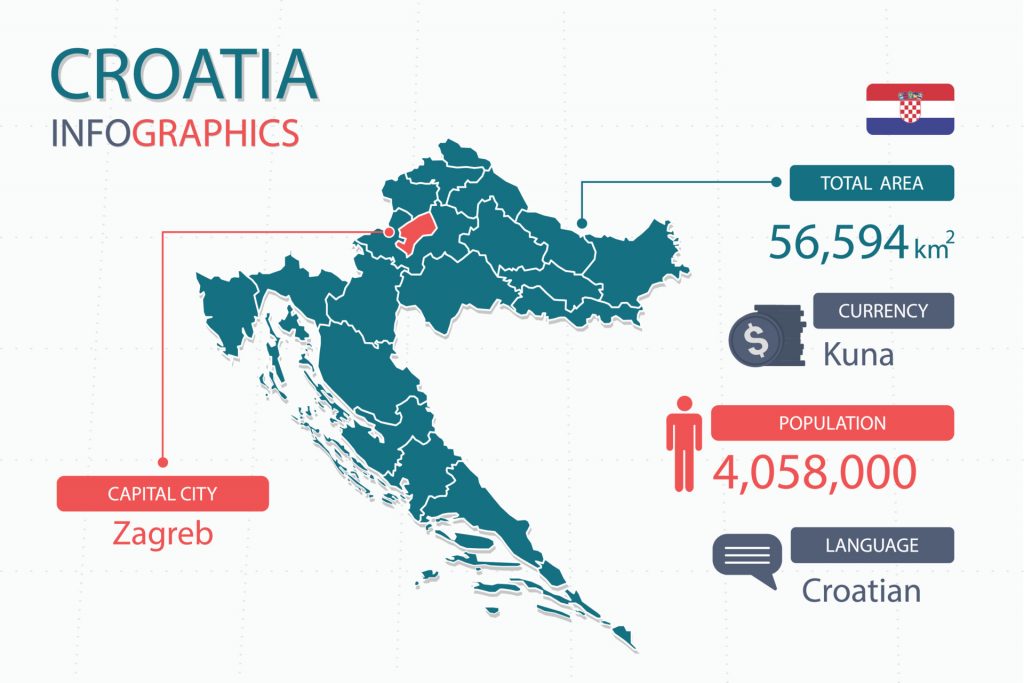The origins of the Croatian Language
Croatian is a standard variety of the Serbo-Croatian language group. While linguists generally group the Serbo-Croatian language group, which includes Bosnian, Serbian, Croatia, and Montenegrin, together in many cases, there are differences that can be identified both linguistically and socio-linguistically. Croatian, as far as the naming of the language is concerned, has to do more with the political atmosphere, the history of different ethnic groups, and how individuals identify themselves in terms of both nationality and ethnic affiliation.
Standard Croatian is the language used by the Croats ethnic group. It is the official language in Croatia but also holds official status in Bosnia and Herzegovina, as well as the European Union. In a number of neighboring countries, it also holds the status of recognized minority language. These countries include Serbia, Slovakia, Montenegro, and Hungary, among others.
Overall, there are about 5.5 million speakers, but this number highly depends on how Croatian is defined. As this article will illustrate, how Croatian is classified is not as clear-cut as some other languages in the world. In addition to being spoken in the countries where it is an official language and a recognized minority language, it is also spoken in many Croatian communities around the world as well.
Croatian, as a standard variety of Serbo-Croatian, is mutually intelligible with the other standard varieties. However, some notable characteristics differentiate it from the others. First, there is a difference in pronunciation due to the fact that Croatian is based on the Ijekavian pronunciation. Moreover, there are a large number of common words as well as grammatical patterns that do not stem from foreign sources, such as is the case with Bosnian, which draws heavily from languages like Arabic and Ottoman Turkish. Lastly, Croatian uses solely the Latin script for writing whereas the others also employ Cyrillic.

The Croatian writing system, employing the Latin script, contains 30 letters. In addition to the Latin basic letters, it has additional letters with accents that are included as official letters, as well as digraphs, a combination of letters considered as one. It is written from left-to-right.
Historically, as a member of the Serbo-Croatian language designation, it is a South Slavic language that shares a very close history with other standard forms of Serbo-Croatian. The Serbo-Croatian language has roots in Old Church Slavonic. This was the religious language of the Slavic areas during the 11th century. Old Church Slavonic, besides being a religious language, began to be used as a spoken language as well, and eventually gave way to Serbo-Croatian somewhere between the 12th and 16th centuries.
In the 17th century, Croatia was semi-autonomous as a political State, but was ruled by two dynasties. They made attempts to solidify Croatia as a political, cultural, and linguistic entity and this helped to differentiate the Serbo-Croatian spoken in Croatia in comparison to the other Serbo-Croatian varieties. However, despite such efforts, a true Croatian standard had not yet emerged at this time.
Croatian began to take on more distinct characteristics during the Illyrian period in the 19th century. During this time, the lands in Croatia contained many speech communities who spoke dialects of Serbo-Croatian that were not yet standardized. This variety also led to an inconsistent spelling and writing system. Thus, there was a movement, called the Illyrian movement to unify the dialects and have a standardized spelling in Croatia so that it can become both a spoken and literary language, one being endowed with a distinguished identity and carrying prestige. With intellectual efforts being led by Ljudevit Gaj to assimilate the Latin alphabet into Croatian use, and other scholars advocating for Shtokavian as the basis of the Croatian standard, Croatian began to take shape into the standard language of Croatia.
While overall, differences may not seem to be that apparent to outsiders, in terms of the Serbo-Croatian speaking communities, differentiating between Croatian and the other varieties can become a hot-button issue, as national identity and ethnic affiliation are deeply tied into the language. This can be seen by actions such as the Declaration on the Status and Name of the Croatian Literary Language made in 1967 by Croatian intellectuals. Even in other Serbo-Croatian speaking countries where there is a sizable ethnic Croat population, ethnic Croats insist on the term Croatian for the language that they speak. As an example, Croats who reside in Bosnia do not call the variety that they use Bosnian, but prefer the term Croatian, as to differentiate themselves, their culture, and their languages from that of the Bozniaks.
Nowadays, Standard Croatian remains the official language of Croatia. Even though Serbo-Croatian is considered one language by many linguists, in those areas where there is a differentiation, Standard Croatian is also considered an official language alongside the other Serbo-Croatian varieties such as Bosnian, and Montenegrin. Thus, Standard Croatian as a language itself, remains an important piece of the puzzle in terms of conducting, understanding the culture, and interacting with the people in the Serbo-Croatian speaking countries, as the language is a reflection of the socio-political circumstances in the region.
VEQTA can provide you with a perfect Croatian translator for your Croatian translation, English to Croatian translation and Croatian to english translation for the your targeted locale. Our translations to Croatian are created with your target audience in mind to meet your expectations.
If you need to translate Croatian – Get in touch today!
A dedicated team of Croatian translators who combines Experience, Specialized Subject Matter Expertise with Translation Practices to deliver quality second to none.
Croatian Subject Expertise
Croatian Translators
Croatian Editors
Croatian Copywriters
Croatian Reviewers
Croatian Voice dubbing
Croatian Subtitling
Croatian Transcription


